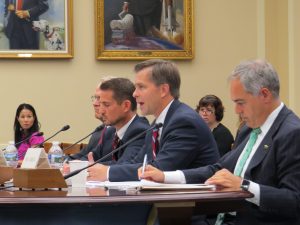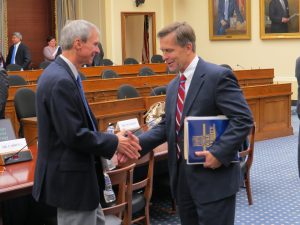
Jim Luther testifies before a congressional committee on oversight of federally funded research.
Last month, Jim Luther, Associate Vice President of finance at Duke University, appeared before a US House Committee on Science, Space, and Technology subcommittee to reaffirm the research university communities’ commitment to working with federal partners to effectively regulate federal research.
His testimony, which can be read here, focused on the — sometimes unintended — impact of federal regulations on researchers and administrators on university campuses, but also outlined important steps institutions and the federal government can take moving forward to increase understanding and collaboration.
OGR: What was the topic of your testimony? What experience did you draw upon when preparing your remarks?
Luther: My testimony focused on the need for and potential to reduce regulatory burden, specifically for faculty in their conduct of research. Our Nation invests $63 billion of taxpayer funds for research & development and universities fund another ~$16 billion; and we, the University community, need to work with federal partners to ensure we use these funds in a responsible AND efficient manner.
I have worked at Duke for more than 25 years in varying capacities and have, for the past decade, routinely interacted with our federal partners at the Office of Management and Budget (OMB), and the National Institutes of Health (NIH). In my interactions with departmental administrators and faculty, it’s clear that everyone who’s involved desires to have an environment that allows our faculty to conduct the great research for which Duke is known. This can only happen if we reduce regulatory burden and let faculty focus on their research, a point I tried to illustrate with my testimony.
OGR: How do federal regulations impact research at universities in general, and Duke specifically?
Regulations are critical and they protect human subjects, animals, the integrity of the science, the environment, and researchers themselves. But without appropriate oversight, complying with federal regulations can adversely impact universities in two primary ways. First, the administrative investments required for personnel, training, and technology systems divert funds away from programmatic support, whether that be academic or research programs. More importantly, however, more and more faculty are pulled into the regulatory quagmire themselves. Per a recent study, 42% of a faculty member’s sponsor funded time is spent on administrative and compliance activities, which, when you think about it, is a staggeringly high opportunity cost for the time and focus of these researchers. Every minute spent on unnecessary regulations is time away from the research lab.

Jim Luther greets Rep. Dan Lipinski (D-IL, G ’98), the subcommittee’s ranking member, following the hearing.
OGR: What message or messages do you hope Members of Congress and their staff took away from today’s hearing?
Luther: I hope the Members of Congress and their staff heard the passion and commitment of universities to work with federal partners to ensure effective oversight and efficient use of taxpayer funds. It’s one of the reasons the university community is supporting H.R. 5583, the University Regulatory Streamlining and Harmonization Act of 2016, which proposes a Research Policy Board, composed of federal and university officials charged with reviewing existing and proposed regulations with the goal of reducing regulatory burden.
It’s clear that the burden is becoming overwhelming and is not sustainable. A report by the National Academies found that on an annual basis, there are 5.8 new or substantially changed regulations. These new regulations and policies will cost universities anywhere from several hundred thousand to several million dollars and result in a significant increase in administrative and faculty workload.
OGR: Conversely, what is important for Duke faculty to know about complying with federal regulations and guidelines?
Luther: Again, I think there are two things: the first is that the regulatory environment at the federal level is quite complex with many regulations that address important programmatic and safety aspects of research, and others regulations that create a tension by focusing on reducing fraud, waste and abuse. And while it’s complicated, if a faculty member either unintentionally or willfully ignores these regulations, it can have a very significant impact on both the individuals as well as Duke’s standing with the federal government and ability to accept federal funds in the future.
Second, and most importantly, the Duke University leadership and administration is extremely supportive of faculty and want to minimize the regulatory burden that faculty bear, both Duke and federally induced. Duke, through, for example, Research Administration Continuous Improvement (RACI), has made a significant investment in personnel resources, systems support, and training and education, to provide support to our faculty and I, along with my colleagues, stand ready to marshal these resources so that we can support our researchers to do what they do best – focus on groundbreaking research.
OGR: Any final thoughts?
In closing, there is a real commitment both on the part of universities and our federal partners to address these issues. Given the amount of critical issues the Congress must resolve before they adjourn – and the short timeframe in which they have to work — there may not be enough time to complete work on these issues right away, but follow-up conversations have already occurred with Congressional Committee staffers in Washington and we expect these to continue.
